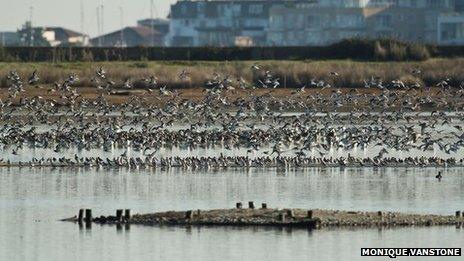Birdsong phone apps 'harmful' to birds, say Dorset experts
- Published

The RSPB has described the actions of some visitors as "selfish"
The "harmful misuse" of mobile phone apps that mimic birdsong can stop birds performing important tasks such as feeding their young, experts have said.
Dorset Wildlife Trust said visitors to Brownsea Island were using apps to imitate Nightjar calls to entice birds out so they could photograph them.
The RSPB said birds could be diverted from vital tasks and said people might be "devastated" if they realised.
Hilary Wilson, from developer iSpiny, said the apps were a learning tool.
"We welcome this discussion into the ethics of using recorded songs," she said.
'No respect'
Brownsea Island nature reserve manager Chris Thain said: "Use of these apps is not suitable for nature reserves and can be potentially harmful to sensitive species."
Tony Whitehead, public affairs officer for the RSPB in the South West said: "Repeatedly playing a recording of birdsong or calls to encourage a bird to respond in order to see it or photograph it can divert a territorial bird from other important duties, such as feeding its young.
"It is selfish and shows no respect to the bird. People should never use playback to attract a species during its breeding season."
Mr Thain added: "The apps are becoming quite common, and are great, but their use needs some guidance I feel.
"I'm sure visitors would be devastated if they realised the possible disturbance they were causing to wildlife."
Dr Wilson, who oversees the Chirp! app for iSpiny and said the firm was the UK's leading developer of apps about birds and bird song, said: "Our apps aim to assist in learning and identifying bird songs and calls but we realise that they may be used to encourage birds to respond.
"We urge great caution - birdsong is simply a pleasant sound to human ears, but to birds it is a powerful means of communication... the issue with recordings is simple - out of consideration for both the birds and fellow birdwatchers, just keep the volume low."
Nesting birds are protected under The Wildlife and Countryside Act 1981, which states it is an offence to intentionally disturb them.
Brownsea Island, which now has signs warning visitors about phone app use, has Special Protection Area status for the habitats it provides for birds, including the Nightjar.
The species' habitats have seen a recent recovery in the county.
- Published8 May 2013
- Published24 April 2013
- Published11 March 2013